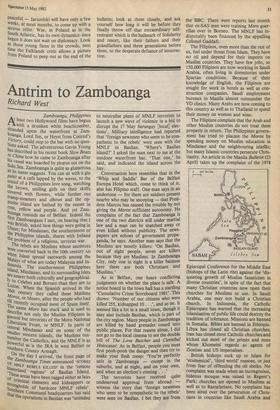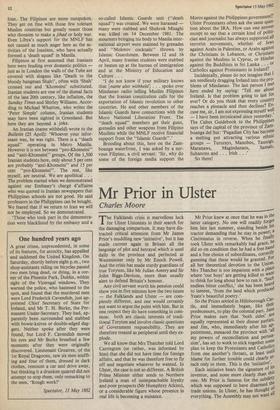Antrim to Zamboanga
Richard West
Zamboanga, Philippines
Aleast two Hollywood films have begun with a drunken white beachcomber, stranded upon the waterfront at Zam- boanga. Lord Jim, or Heyst from Conrad's victory, could step to the bar with no ques- tions asked. The adventurous Gavin Young has described in his recent book Slow Boats to. China how he came to Zamboanga after his vessel was boarded by pirates out on the Sulu Sea. Zamboanga is quite as glamorous as its name suggests. You can sit with a gin POW at a cafe lapped by the waves, to the sound of a Philippines love song, watching the brown, smiling girls on their skiffs covered with flowers, while further out tramp-steamers and dhows and the op- posite island are bathed by the sunset in rose, yellow 1. and purple. And yet Zam- boanga reminds me of Belfast. Indeed the first Zamboangans I met, on hearing that I Was British, asked how things were going in Ulster; for Mindanao, the southernmost of the Philippine islands, shares with Ireland the Problem of a religious, terrorist war. The rebels are Muslims whose ancestors Were converted back in the 10th century AD When Islam spread eastwards among the Malays of what are today Malaysia and In- donesia. The southernmost Philippines island, Mindanao, and its surrounding islets are nearer both culturally and geographical- ly to Celebes and Borneo than they are to uzon. When the Spanish arrived in the 16th century they called these Muslims Moron, or Moors, after the people who had till recently occupied most of Spain itself. The name Moro has stuck and is used to describe not only the Muslim Filipinos in general but terrorists of the Moro National Liberation Front, or MNLF. In parts of central Mindanao and on some of the smaller western islands, the Muslims out- number the Catholics, and the MNLF is as Powerful as is the IRA in west Belfast or southern County Armagh. On the day I arrived, the front page of the Zamboanga Times announced 'SCORES hinterland MNLF REBELS KILLED' in the 'remote h„interland regions' of Basilan Island. T_hese areas have been tagged either as lairs O criminal elements and kidnappers or strongholds of hardcore MNLF rebels'.
that Command headquarters has said that the operations in Basilan was 'intended
to neutralise plans of MNLF terrorists to launch a new wave of violence in a bid to disrupt the 17 May barangay [local] elec- tions'. Military intelligence had reported that 'foreign newsmen who seem to be sym- pathetic to the rebels' were seen with the MNLF in Basilan. 'Where's Basilan island?' I asked the man next to me at the outdoor waterfront bar. 'That one,' he said, and indicated the island across the bay. Conversation here resembles that in the `Whip and Saddle' Bar of the Belfast Europa Hotel which, come to think of it, also has Filipino staff. One man says in an undertone — for there are soldiers present nearby who may be snooping — that Presi- dent Marcos has caused the trouble by not giving the Moros sufficient autonomy. He complains of the fact that Zamboanga is one of the two districts still under martial law and a man can be snatched away or even killed without publicity. The news- papers are echoes of government propa- ganda, he says. Another man says that the Muslims are mostly killers: 'On Basilan, out of eight people, seven are killers because they are Muslims. In Zamboanga City, only one in eight is a killer because here there are both Christians and Muslims.'
As in Belfast, one hears conflicting judgments on whether the place is safe. A notice board in the town hall has a
startling `Cumulative Crime Scoreboard 1981'. This shows: 'Number of our citizens who were killed 255, kidnapped 10 . . .', and so on. It seemed like a lot in a small town, though it may also include Basilan, which is part of the city region. Many people in Zamboanga are killed by hand grenades tossed into public places. For that reason alone, I did not go to the local cinema to see the double bill of The Love Butcher and Cannibal Holocaust. As in Belfast, people you meet first pooh-pooh the danger and then try to make your flesh creep: 'You're perfectly safe in Zamboanga — except in the suburbs, and at night, and on your own, and when an election's coming . . •'
The terrorists have received quite undeserved approval from abroad witness the story that 'foreign newsmen who seem to be sympathetic to the rebels' were seen on Basilan. I bet they are from
the BBC. There were reports last month that ex-SAS men were training Moro guer- rillas over in Borneo. The MNLF has in- disputably been financed by the appalling Colonel Gaddafi.
The Filipinos, even more than the rest of us, feel under threat from Islam. They have no oil and depend for their imports on Muslim countries. They have few jobs, so 150,000 Filipinos are now working in Saudi Arabia, often living in dormitories under Spartan conditions. Because of their knowledge of English, the Filipinos are sought for work in hotels as well as con- struction companies. Saudi employment bureaux in Manila almost outnumber the VD clinics. Many Arabs are now coming to this country as well as to Thailand to spend their money on women and wine.
The Filipinos complain that the Arab and other Muslim countries do not treat them properly in return. The Philippines govern- ment has tried to placate the Moros by spending money on Muslim education in Mindanao and the neighbouring islands; but many Islamic countries persecute Chris- tianity. An article in the Manila Bulletin (23 April) takes up the complaint of the 1978
Episcopal Conference for the Middle East (bishops of the Latin rite) against the 'dis- quieting growth of Muslim fanaticism in diverse countries', in spite of the fact that many Christian countries now open their churches for Muslims to use. In Saudi Arabia, one may not build a Christian church. In Indonesia, the Catholic Episcopate has warned that the increasing Islamisation of public life could destroy the tradition of tolerance. Missions are banned in Somalia. Bibles are banned in Ethiopia. Libya has closed all Christian churches; Iran has closed most Catholic churches,and kicked out most of the priests and nuns whom Khomeini regards as agents of Zionism and US imperialism.
British bishops suck up to Islam for 'ecumenical', 'third world' reasons, or just from fear of offending the oil sheiks. No complaint was made when an incongruous, hideous mosque was raised in Regent's Park; churches are opened to Muslims as well as to Rastafarians. No complaint has been aired over the persecution of Chris- tians in countries like Saudi Arabia and
Iran. The Filipinos are more outspoken. They get on fine with those few tolerant Muslim countries but greatly resent those who threaten to make a jihad or holy war. Even Libya's support for the MNLF has not caused as much anger here as the ac- tivities of the Iranians, who have actually formed a 'death squad' in Manila.
Filipinos at first assumed that Iranians here were feuding over domestic politics just as in London the walls of the Tube are covered with slogans like 'Death to the bloody hangman Shah!', often with 'Shah' crossed out and 'Khomeini' substituted. Iranian students are one of the dismal facts of the late 20th century, like inflation, the Sunday Times and Shirley Williams. Accor- ding to Michael Wharton, who writes the 'Peter Simple' column, Iranian students may have been sighted in Greenland. But here they are beyond a joke.
An Iranian (name withheld) wrote to the Bulletin (25 April): 'Whoever your infor- mant was, he was right. There is a "death squad" operating in Metro Manila. However it is not between "pro-Khomeini" and "anti-Khomeini" groups. Of the 1,500 Iranian students here, only about 5 per cent are probably "anti-Khomeini" and 15 per cent "pro-Khomeini". The rest, like myself, are neutral. We are apolitical . . . The problem started when we demonstrated against our Embassy's chargé d'affaires who was quoted in Iranian newspapers that Philippines schools are not good. He said professors in the Philippines can be bought. We feared that if we return to Iran we will not be employed. So we demonstrated.
'Those who took part in the demonstra- tion were blacklisted by the embassy and a so-called Islamic Guards unit ("death squad") was created. We were harassed many were stabbed and Shahrok Misaghi was killed on 14 December 1981. The mourners bringing his body to Manila inter- national airport were maimed by grenades and "Molotov cocktails" thrown by Islamic Guardsmen. Between 12 and 16 April, many Iranian students were stabbed or beaten up at the bureau of immigration and at the Ministry of Education and Culture . .
'I do not know if your military knows that [name also withheld] . . . spoke over Mindanao radio telling Muslim Filipinos that the Iranian constitution calls for the exportation of Islamic revolution to other countries. He and other members of the Islamic Guards have connections with the Moro National Liberation Front. The "death squad" members get their guns, grenades and other weapons from Filipino Muslims while the MNLF receive financial support from the "Islamic Guards".'
Brooding about this, here on the Zam- boanga waterfront, I was asked by a ner- vous Filipino, a civil servant: 'Sir, why do some of the foreign media support the Moros against the Philippines government?' Ulster Protestants often ask the same ques- tion about the IRA. How can one answer except to say that a certain kind of politi- cian and journalist has always supported all terrorist movements, whether of Jews against Arabs in Palestine, or Arabs against the Christians in Lebanon, or Christians against the Muslims in Cyprus, or Hindus against the Buddhists in Sri Lanka . . . or Catholics against Protestants in Ireland?
Incidentally, please do not imagine that I am needlessly dragging Ireland into the pro- blems of Mindanao. The last person I met here ended by saying: 'Tell me about Ireland. Is that problem going to last for ever? Or do you think that every country reaches a pinnacle and then declines? Ex- cuse me, sir, I am not expressing myself well — I have been intoxicated since yesterday. The Caltex Guidebook to the Philippines says of the capital of the province of Zam- boanga del Sur: 'Pagadian City has become a melting pot attracting various ethnic groups — Tururays, Manobos, Tausogs, Maranaws, Magindanaos, Sarnals, Subanons and . . . Irish . . So there!







































 Previous page
Previous page